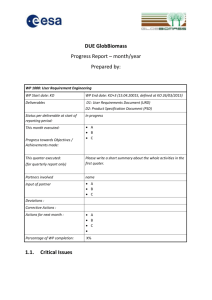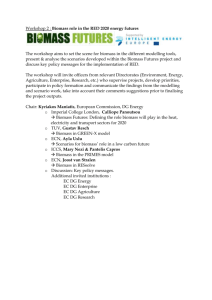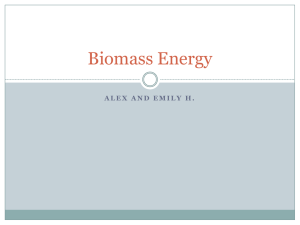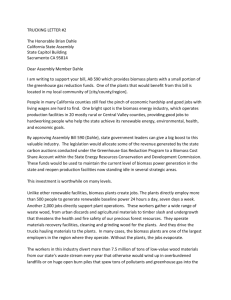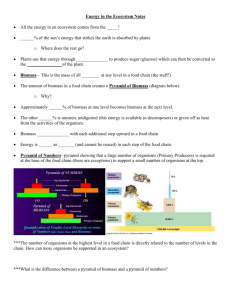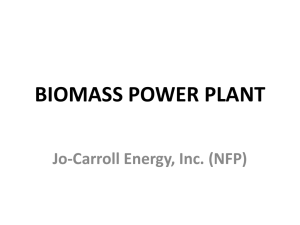Modified Biomass – E. coli
advertisement
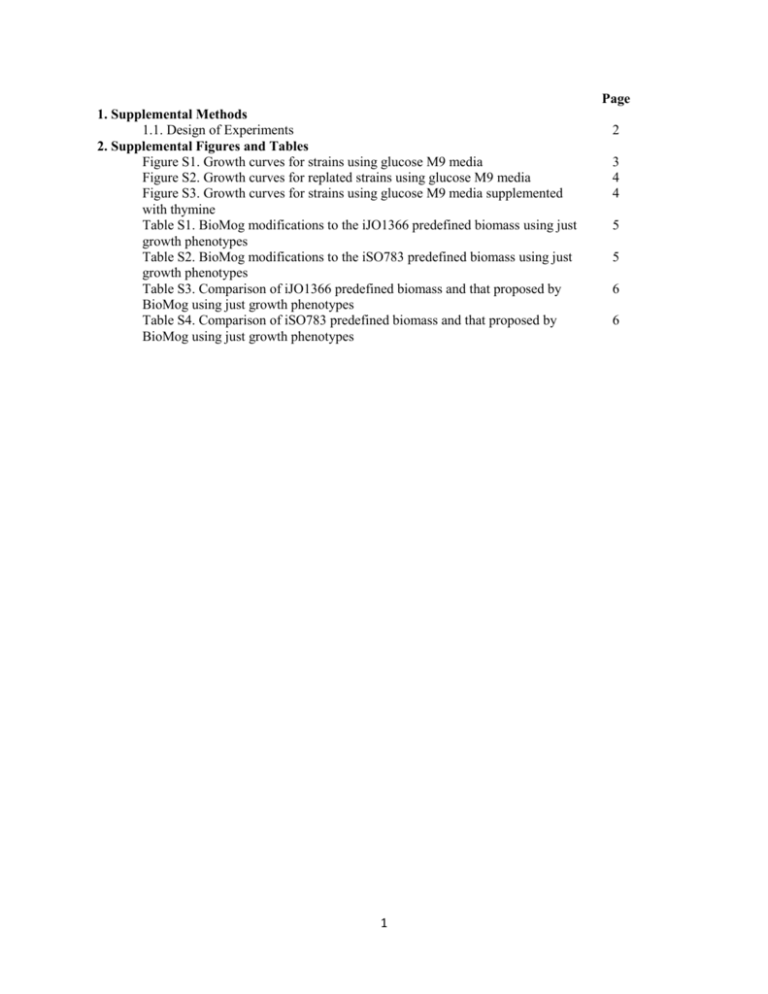
Page 1. Supplemental Methods 1.1. Design of Experiments 2. Supplemental Figures and Tables Figure S1. Growth curves for strains using glucose M9 media Figure S2. Growth curves for replated strains using glucose M9 media Figure S3. Growth curves for strains using glucose M9 media supplemented with thymine Table S1. BioMog modifications to the iJO1366 predefined biomass using just growth phenotypes Table S2. BioMog modifications to the iSO783 predefined biomass using just growth phenotypes Table S3. Comparison of iJO1366 predefined biomass and that proposed by BioMog using just growth phenotypes Table S4. Comparison of iSO783 predefined biomass and that proposed by BioMog using just growth phenotypes 1 2 3 4 4 5 5 6 6 Supplemental Methods: 1.1 Design of Experiments For expected biomass components for which there were no experiments to support a particular metabolite’s inclusion or exclusion from biomass, additional experiments can be designed using the following formulation: Outer Objective 100 ∗ 𝜖 min ∑ 𝑥𝑖 − 𝑑𝑒𝑙𝑃𝑒𝑛𝑎𝑙𝑡𝑦 ∗ ∑(𝑘𝑜𝑔 − 1) − 𝑎𝑙𝑡𝑃𝑒𝑛𝑎𝑙𝑡𝑦 ∗ 𝑖∈𝑏𝑖𝑜𝑀𝑒𝑡𝑎𝑏 − 𝑒𝑠𝑠𝑒𝑛𝑡𝑖𝑎𝑙𝑃𝑒𝑛𝑎𝑙𝑡𝑦 ∗ 𝑔∈𝐺 ∑ −𝑓𝑗 (1) 𝑗∈𝐴𝑙𝑡𝑀𝑒𝑑𝑖𝑎 ∑ (𝑚𝑗 − 1) 𝑗∈𝐸𝑠𝑠𝑒𝑛𝑡𝑖𝑎𝑙 Inner Problem max vj ,xi ∑ 𝑥𝑖 (2) 𝑆𝑖𝑗 ∗ 𝑣𝑗 = 0 , ∀𝑖 ∈ 𝑀\𝑏𝑖𝑜𝑚𝑒𝑡𝑎𝑏 (3) 𝑆𝑖𝑗 ∗ 𝑣𝑗 − 𝑥𝑖 = 0 , ∀𝑖 ∈ 𝑏𝑖𝑜𝑚𝑒𝑡𝑎𝑏 (4) 𝑖∈𝑏𝑖𝑜𝑀𝑒𝑡𝑎𝑏 ∑ 𝑗∈𝑅\𝐵𝑙𝑜𝑐𝑘𝑒𝑑 ∑ 𝑗∈𝑅\𝐵𝑙𝑜𝑐𝑘𝑒𝑑 𝑢𝑝𝑝𝑒𝑟 (5) (6) (7) (8) (9) (10) (11) 𝑣𝑗 ≤ 𝑣𝑗 , ∀𝑗 ∈ 𝑅\𝐵𝑙𝑜𝑐𝑘𝑒𝑑 𝑙𝑜𝑤𝑒𝑟 −𝑣𝑗 ≤ 𝑣𝑗 , ∀𝑗 ∈ 𝑅\𝐵𝑙𝑜𝑐𝑘𝑒𝑑 𝑣𝑗 = 0, ∀𝑗 ∈ 𝐷𝑒𝑙𝑆𝑒𝑡𝑗 , 𝑖𝑓 𝑎𝑗 = 0 −𝑣𝑗 ≤ 0, ∀𝑗 ∈ 𝑀𝑒𝑑𝑖𝑎𝑆𝑒𝑡, 𝑖𝑓 ℎ𝑗 = 0 −𝑣𝑗 ≤ 0, ∀𝑗 ∈ 𝐸𝑥𝑐ℎ\𝑀𝑒𝑑𝑖𝑎𝑆𝑒𝑡 ′′ −𝜇 ≤ −𝜖 Network Specific Constraints Outer Constraints Deletion Rules Media Rules (12) (13) The outer objective function (Eq. 1) attempts to find a solution where the metabolite of interest, biometab, is production blocked while minimizing the number of deletions, kog, and media alterations – either auxotrophic supplements, fj, or removal of essential (typically inorganic) metabolites, mj. For the purposes of this project, the following penalty variables were used: epsilon was set to 0.01, delPenalty was set to 1, altPenalty was set to 0.25 and essentialPenalty was set to 1. The inner problem is designed to maximize the flux of the metabolite of interest through the sink, xi, to ensure that in any valid optimal proposal the blocked metabolite will be production and not consumption blocked. Eq. 3 and 4 are material balances without and with an association to the metabolite of interest. 2 Eq. 5 and 6 are standard flux constraints while Eq. 7 and 8 are conditional constraints associated with reaction deletions, aj, and media selection, hj. Eq. 10 ensures that the proposed mutant is viable (i.e., there is flux through µ’’, the modified biomass flux). Here it is assumed that the metabolite of interest is not an essential metabolite; thus, if the originally proposed biomass includes this metabolite, the stoichiometric matrix biomass entry is modified such that the metabolite of interest is no longer a member. Outer constraint deletion and media rules are as defined by Tervo and Reed [10] with the addition of another media subset, essential, used to handle the removal of essential inorganic metabolites. The dual problem and the complete media and deletion rules are provided as a supplementary file S2 for those interested. Supplemental Figures and Tables: Figure S1: Growth curves for strains using glucose M9 media. While the wild type strain exhibited healthy growth, the ΔthyA mutant was fatal. The very slight growth is likely attributable to residual LB + thymine from the strains preculture (see Figure S2). In this and the remaining growth experiments, strains were grown in triplicate, and the error bars represent the standard deviation of those experiments. 3 Figure S2: Growth curves for transferred strains using Glucose M9 media. To verify that the ΔthyA was unable to grow in unsupplemented glucose M9 medium, a 10 µL aliquot was transferred from each cell from the original 96 well plate experiments in Figure S1 into fresh media. No subsequent growth was observed for the ΔthyA mutant. Figure S3: Growth curves for strains on glucose M9 media supplemented with thymine. By growing ΔthyA on media that also contains thymine, we see a full recovery of the ΔthyA strain’s growth suggesting that ΔthyA is a thymine auxotroph. 4 Table S1: BioMog modifications to the iJO1366 predefined biomass using just growth phenotypes. Added metabolites are compounds that BioMog recommends to be added to the core biomass to account for unexplained no growth phenotypes. Unchanged metabolites are those biomass components for which there was no or insufficient evidence for removal, while the removed category is composed of biomass components whose removal would improve the models growth phenotype predictions. No analytically measured metabolites were used in the BioMog objective (i.e. EM was an empty set). Modified Biomass – E. coli Added Unchanged Removed 23dhbzs UDCPDP bmocogdp fe2 leu-L ni2 sheme ca2 2omhmbl 10fthf btn fe3 lys-L pe160 so4 cu2 3php 2fe2s cl gln-L met-L pe160_p thf dttp 5fthf 2ohph coa glu-L mg2 pe161 thmpp glu5p 4fe4s cobalt2 gly mlthf pe161_p thr-L pgp180 ala-L ctp gtp mn2 phe-L trp-L seln amet cys-L h2o mobd pheme tyr-L arg-L datp his-L murein5px4p_p pro-L utp asn-L dctp ile-L nad pydx5p val-L asp-L dgtp k nadp ribflv zn2 atp fad kdo2lipid4_e nh4 ser-L Table S2: BioMog modifications to the Shewanella predefined biomass using just growth phenotypes. Added metabolites are compounds that BioMog recommends to be added to the core biomass to account for unexplained no growth phenotypes. Unchanged metabolites are those biomass components for which there was no or insufficient evidence for removal, while the removed category is composed of biomass components whose removal would improve the models growth phenotype predictions. No analytically measured metabolites were used in the BioMog objective (i.e. EM was an empty set). Modified Biomass – S. oneidensis Added 1pyr5c phthr 34hpp pser-l 4mop trp-l amet arg-l cinnm gdptp glucys his-l phom Unchanged amp dna_son glycogen nad nadh nadp nadph ptrc rna_son 12dag3p 12dgr 5mthf accoa agpe agpg coa fad lps_so pe Removed peptx_e pgly protein_son_aerobic spmd succoa udpg Table S3: Comparison between E. coli predefined and BioMog proposed biomass components using just growth phenotypes. Overlap indicates metabolites that are present in the predefined biomass and are components (or their alternatives) 5 of the de novo biomass components. Essential precursors are metabolites whose removal from the network under the tested conditions would result in a no growth phenotype (i.e., their essentiality is implied by the proposed components of the BioMog biomass). Abbreviations match those used in the iJO1366 model. No analytically measured metabolites were used in the BioMog objective (i.e. EM was an empty set). E. coli Biomass Comparisons De novo Biomass 23dhbzs 2omhmbl 5fthf clpn181_p glu5p pser-L Slnt Overlap ctp murein5px4p_p dctp nadp arg-L pe160 btn pe160_p coa pe161 fad pe161_p his-L phe-L ile-L pheme kdo2lipid4_e pro-L leu-L pydx5p lys-L sheme thmpp trp-L UDCPDP iJO1366 – Essential Precursors 10fthf gly utp 2fe2s gtp 2ohph h2o ala-L met-L amet nad asp-L nh4 atp ribflv cys-L ser-L fe2 thf gln-L thr-L glu-L tyr-L iJO1366 - Uniques 4fe4s k asn-L mg2 bmocogdp mlthf ca2 mn2 cl mobd cobalt2 ni2 cu2 val-L datp zn2 dgtp dttp fe3 Table S4: Comparison between S. oneidensis predefined and Biomog proposed biomass components using just growth phenotypes. Categories are identical to those in table 2 with the exception of De Novo – Essential Precursors which is composed of metabolites from the de novo biomass that are precursors to the predefined biomass (specifically, upstream metabolites of protein_son_aerobic in this instance). No analytically measured metabolites were used in the BioMog objective (i.e. EM was an empty set). S. oneidensis Biomass Comparisons De Novo Biomass gthrd gdptp ohpb phom pser-l Overlap dna_son rna_son iSO783 – Essential Precursors 5mthf accoa amp coa nad nadh nadp nadph succoa 6 De Novo – Essential Precursors arg-l his-l leu-l met-l phe-l pro-l trp-l tyr-l iSO783- Uniques 12dag3p pgly 12dgr protein_son_aerobic agpe ptrc agpg spmd fad udpg glycogen lps_so pe peptx_e

